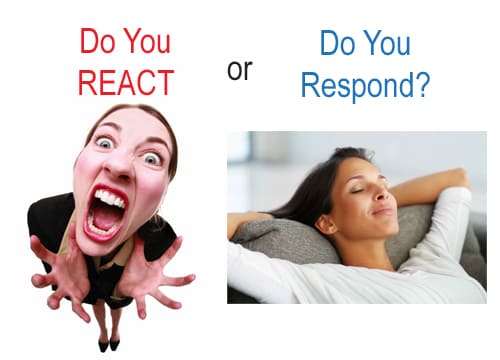Have you ever found yourself regretting something you said or did in the heat of the moment? This often occurs when we react impulsively instead of responding thoughtfully. In this article, we’ll explore the key differences between reacting and responding and share strategies to help you respond more constructively in your daily interactions.
Understanding the Difference Between Reacting and Responding
The simplest way to distinguish between reacting and responding lies in their focus: reacting is centered on the immediate moment, while responding takes into account the potential future outcomes.
In challenging situations or conflicts, reacting might provide a brief emotional release, but it often fails to contribute positively to the long-term resolution of the issue.
The ability to respond rather than react is a key aspect of emotional intelligence. It requires intentionally pausing, regulating your emotions in the moment, and thoughtfully considering the long-term consequences of your actions before deciding how to proceed.

Advantages of Responding
When we take control of how we respond, we increase our ability to achieve the outcomes we desire. Being responsive rather than reactive enhances our chances of success by helping us navigate change more effectively and resolve conflicts more constructively. Additional benefits include:
- Improved Decision-Making: Thoughtful responses lead to better choices.
- Heightened Empathy: Considering others’ perspectives fosters understanding.
- Stronger Relationships: Building trust and respect through mindful interactions.
- Reduced Regret or Guilt: Avoiding impulsive actions minimizes negative emotions.
- Greater Accountability: Taking responsibility for your actions enhances personal growth.
By focusing on responding, you cultivate a more intentional and empowered approach to life’s challenges.
Things to Remember
It’s important to remember that responding doesn’t mean ignoring your immediate emotions or invalidating them. It also doesn’t mean that others’ actions won’t sometimes provoke reactions that feel entirely justified.
Instead, it’s about recognizing and acknowledging your emotions, then intentionally regulating them to achieve a more constructive outcome than acting impulsively would allow.
Responding allows us to focus on what we can control, empowering us to make intentional choices in how we react to any situation.
While this may sound great in theory, it’s not always easy in practice. Insecurities, fears, and our natural defense mechanisms can often lead us to react emotionally in ways that may not be ideal.
When this happens, it’s important to practice self-compassion, acknowledging that we won’t always act the way we’d like. Pair this understanding with a commitment to improve in the future. Like any emotional regulation skill, the ability to respond rather than react can be developed and strengthened over time.
Improving Your Ability to Respond Rather Than React
Awareness
The key to responding instead of reacting lies in understanding how emotions influence behavior. It’s not about suppressing or ignoring your feelings but about acknowledging and accepting them. Recognize what you’re feeling, consider what those emotions might signify, and regulate them in a way that aligns with your desired outcome. This awareness creates space for thoughtful and intentional action.
Pause
Reacting often happens instantly and impulsively, while responding requires a deliberate pause. Once you become aware of your emotions or feel the urge to react, take a moment to step back. This might involve taking a few deep breaths, grounding yourself, or expressing the need for space or time before offering a response. This pause allows for clarity and intentionality in your actions.
Access Your Empathy
Responding thoughtfully involves considering more than just your own perspective. It requires awareness of the other person—what they might need and how your response will impact them. By tapping into your empathy and actively seeking to understand their viewpoint, you can make more compassionate and constructive decisions about how to respond.
Learn More About Yourself
Reactions often arise from underlying insecurities, fears, or defensiveness. Taking the time to understand yourself—what triggers you, what bothers you, and how you tend to handle conflict—can help you uncover the root causes of automatic reactions. This self-awareness is key to transforming impulsive reactions into thoughtful responses.
Regular Stress-Relief Practices
Stress can heighten emotional reactivity, making it harder to respond thoughtfully. Incorporating regular stress-relief practices into your daily routine—such as exercise, meditation, deep breathing, or even talking with a friend—can help you stay grounded and better equipped to respond constructively in challenging situations.
Bring It to Coaching
Responding rather than reacting offers numerous benefits, both personally and in our relationships. It’s a skill grounded in emotional intelligence that enables us to handle challenging situations more constructively, with greater consideration for the long-term consequences of our present actions. If you’d like support in developing this ability, using the strategies outlined above, partnering with a coach can be an excellent way to begin your journey.